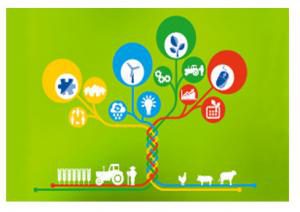The Committee of the Regions’ (CoR) opinion on the Common Agricultural Policy (CAP) post-2020, commissioned by European Commission Vice-President Timmermans, will be discussed during the next plenary session of the CoR in July 2017 (see our previous news post from 3 April 2017, “CoR Opinion on the future CAP under preparation?”) but was recently adopted by the CoR Commission for Natural Ressources (NAT) already on 1 June 2017. Further changes to the opinion are to be foreseen before and during the next CoR plenary.
Rapporteur Guillaume Cros is pleading for a new CAP, integrating more food and agri-food aspects.
A new Common Agricultural Policy for more fairness and solidarity
According to the opinion, it is the role of the CAP to ensure more fairness and solidarity.
 More fairness and solidarity between farmers and the rest of society because too many farmers have an income that is below the poverty threshold, because the value of food production is extracted downstream by suppliers and the agro-food industry, and because the development of urban areas is galloping and nibbling more and more on fertile farmlands.
More fairness and solidarity between farmers and the rest of society because too many farmers have an income that is below the poverty threshold, because the value of food production is extracted downstream by suppliers and the agro-food industry, and because the development of urban areas is galloping and nibbling more and more on fertile farmlands.
More fairness and solidarity between Member States by fighting against the concentration of subsidies due to direct payments per hectare.
More fairness and solidarity between different rural areas affected differently by climate change and having inherited different agricultural practices and farming intensity models.
And finally, more fairness and solidarity between EU and non-EU countries regarding carbon emissions of the EU caused by food imports, being food from countries with very low labour costs, exports of EU surpluses undermining non-member economies, no regulation of market volatility, and making more efforts for international agricultural trade rules and genuine cooperation agreements.
The 9 post-2020 objectives for the CAP
The opinion points out 9 new objectives for the CAP after 2020:
- Developing sustainable and prosperous agriculture anchored in the diversity of rural areas
- Guaranteeing the food security of European population at fair prices
- Providing a healthy, nutritious, varied and high-quality diet, sourced primarily from the surrounding area in a circular economy approach
- Ensuring a fair and sufficiently stable income for farmers

- Guaranteeing the renewal of the largest possible number of farms, underpinning the dynamism of rural areas
- Not destabilising the agricultural economies of third countries
- Ensuring that all agricultural production methods are based on practices that protect human health, soil and the environment, including the aquatic environment, enhance biodiversity both in the wild and on farmland, meet animal protection standards, and reduce global warming, e.g. by reducing the emission of harmful greenhouse gases
- Distributing the public funds of the CAP more fairly among farms and Member States according to objective, non-discriminatory criteria, based on their ability to contribute to the EU’s sustainable development objectives
- Applying the proportionality principle to the monitoring system to which farmers are subject
- Promoting economic, social and environmental development of all rural areas
The opinion elaborates on two main topics: transitioning towards prosperous and sustainable farms at a human scale, and strengthening the rural dimension of the CAP. The opinion actively supports the plea for a Rural Agenda as promoted by Euromontana, the Committee of the Regions and different organisations from the civil society.
Innovative measures put forward by the opinion
An innovative point developed in this opinion is the transition from direct payments by hectare to capped direct payments per hectare modulated by farm worker. This measure would be fairer for mountain agriculture which faces difficult climatic conditions and higher production costs and would also support territorial value chains for high value-added products such as mountain quality food products, as pointed out in the opinion. This measure for capped direct payments modulated by farm worker would also support small-scale farming; young farmers; transitional farming systems towards more resilient, autonomous and input-free production methods; organic farmers; and high-environmental value farming, among others. The CoR calls for an equalisation of direct payments among Member States and fairer distribution of public funds of the CAP among farms.
Other highlights of the opinion are the recommendations for better market regulation of food products and the integration of different EU funds.
The opinion also gives importance to the environmental dimension and the risks agriculture poses for water quality, soil erosion and degradation, and biodiversity – some recommendations for agricultural and forest land management to enhance environmental and social beneficial outcomes will soon be published by the PEGASUS project on that aspect also. The opinion highlights 3 environmental measures already: crop rotation, ban on ploughing permanent grasslands and ecological focus areas.
Our fellow researchers might be interested in knowing that the opinion calls for more research funded by the EU budget and the EIB on agricultural and rural cooperation, in particular: social innovation in rural areas, sustainable forest management, farm resilience, restoring soil fertility, farming practices fighting climate change, high-quality and environmentally-friendly production methods. The H2020 SIMRA project ends in 2020 and should also provide policy recommendations post-2020 for social innovation in marginalised rural areas.
Conclusions
 In his wrap-up, rapporteur Guillaume Cros further insisted on the necessity for the European Commission to evaluate the European Structural Funds through the rural lens as recommended by the Cork Declaration 2.0 and make them easier to use for a better territorial approach. Indeed, the Committee of the Regions welcomes the smart villages initiative of DG AGRI (see our news item on that new action plan here) but would like smart rural territories to also be considered. Integrated funds should allow for more local initiatives in support of innovation, leisure activities, connectivity, training, public services, landscapes, small-scale renewable energy production units, etc.
In his wrap-up, rapporteur Guillaume Cros further insisted on the necessity for the European Commission to evaluate the European Structural Funds through the rural lens as recommended by the Cork Declaration 2.0 and make them easier to use for a better territorial approach. Indeed, the Committee of the Regions welcomes the smart villages initiative of DG AGRI (see our news item on that new action plan here) but would like smart rural territories to also be considered. Integrated funds should allow for more local initiatives in support of innovation, leisure activities, connectivity, training, public services, landscapes, small-scale renewable energy production units, etc.
The Rural Agenda is a good foundation but should be supported by political decisions which necessarily take into account the rural divide, such as the horizontal implementation of rural proofing by the European Commission in all sectoral policies for instance. Indeed, all sectoral policies should be extended to rural areas to enable positive rural-urban interlinkages. The opinion is in favour of making the territorial approach a priority and maintaining the Cohesion Policy and Funds, in order to stop concentrating agricultural production in certain regions at the expense of others and to avoid at all costs distortions of competition on the agricultural market.
20 June 2017









